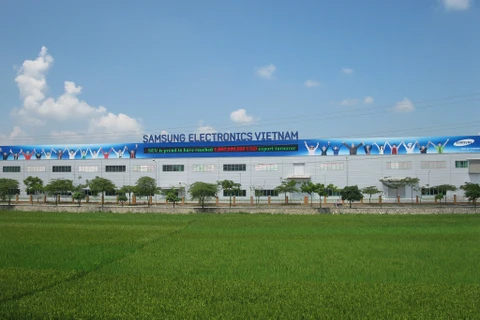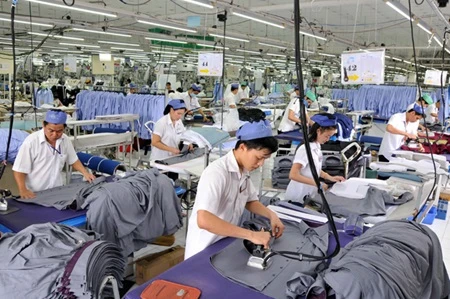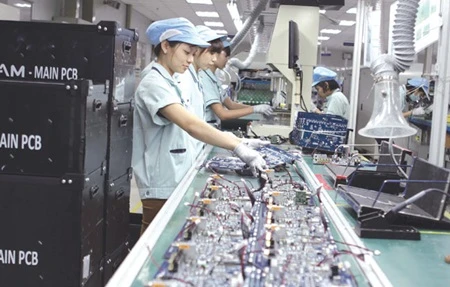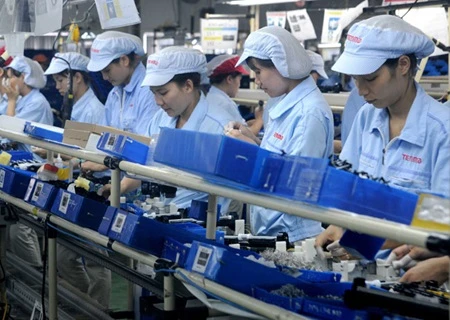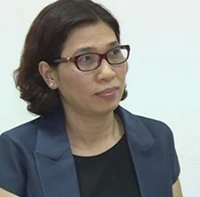Hanoi (VNA) - Capital from regional neighbours into Vietnam is increasing, the Foreign Investment Agency (FIA) under the Ministry of Planning and Investment (MPI) said.
ANA Holdings Inc, owner of Japan's biggest airline All Nippon Airways, will buy an 8.8 percent stake in national flag carrier Vietnam Airlines. Vietnam Airlines Chief Executive Officer Pham Ngoc Minh told Bloomberg on January 12 that the deal will close sometime between March and June.
On January 6, Singapore's Maple Co Ltd received an investment license to build a 110-million-USD garment factory in the Vietnam-Singapore Industrial Park in the northern province of Bac Ninh. The facility is expected to produce 22 million products per year when it comes into operation in 2018.
Malaysia's United More SDN.Bhd was also licensed on January 7 to build a 21- million-USD plant to make TV screen frames and plastic covers in the Saigon Hi-Tech Park. The plant is set to begin production in the second quarter, with an initial capacity of four million units per year.
Investments by Thai businesses have particularly been busy, according to the local press.
The Government's online newspaper, baochinhphu.vn, reported that Thai beer firm Singha Asia is expected to complete its 1.1-billion-USD purchase of Masan Group stakes in January.
With this deal, Singha will hold a 25 percent stake in Masan Consumer Holdings and 33.3 percent in Masan Brewery – units that own food and drink brand names such as Chinsu, Omachi, Vinacafe and Su Tu Trang (White Lion) Beer.
Last year, Power Buy, a subsidiary of Thai retail giant Central Group, acquired a 49 percent stake in NKT, a technology development firm owning the Nguyen Kim electronic store chain in Vietnam.
Also in 2015, Thai Beverage offered to buy about 40 percent of HCM City-based Saigon Beer Alcohol Beverage JSC, better known as Sabeco, according to financial news website ndh.vn.
The FIA noted to ndh.vn that, Thai firms had recently expressed concerns about many investors moving from their country to Vietnam, Malaysia and Singapore – the Southeast Asian nations taking part in the Trans-Pacific Partnership (TTP).
While the TTP is set to take effect in 2018, businesses in the Federation of Thai Industries were also worried that their goods would face stiffer competition from those coming from the countries joining the pact.
Last year, the Republic of Korea's LG Electronics, the world's second largest TV maker, decided to move its TV production facilities from Thailand to Vietnam to save costs and increase capacity.
The FIA said the Republic of Korea’s Government encouraged companies to invest in Vietnam during 2015, considering this a strategic investment destination.
The encouragement came in the context that most of the Republic of Korea's leading businesses, including Samsung, Canon, POSCO, Hyundai and KEPCO, had already invested in Vietnam.
"There is a trend in capital flows," said Can Van Luc, senior management advisor at the Bank for Investment and Development of Vietnam (BIDV) and Director of the BIDV Training School.
Luc told ndh.vn that Vietnam was expected to receive more capital moving not only from Thailand but also from China this year.
During 2015, about 548 billion USD was poured into emerging economies, which are widely known as economies with low to middle per capita income, while up to 1.1 trillion USD was taken out of them.
This meant that a net 540 billion USD was withdrawn in 2015, the highest level in the last 27 years.
China's economic slowdown and the US Federal Reserve increasing interest rates, which are currently near zero percent, are reportedly driving investor withdrawals from the emerging markets.
To Trung Thanh, who is an associate professor at the National Economics University, pointed out that Vietnam's accelerating integration progress would be an advantage for the country to attract more foreign investment.
Last year, the country concluded negotiations for four free trade agreements, including those with the Eurasian Economic Union, the European Union, the Republic of Korea and the Trans-Pacific Partnership. It also became a member of the ASEAN Economic Community, which was established last December 31.
Official sources said the country is now deeply integrated into 55 global economies, and it has slashed more than 90 percent of its tariffs to zero percent.
A recent Bloomberg report on growth prospects of 93 global economies forecast that Vietnam will grow by 6.6 percent in 2016, the second fastest after India with 7.4 percent.
Vietnam's growth was also expected to top Southeast Asia, higher than the anticipated 5.2 percent for Indonesia, 4.5 percent for Malaysia, 3.2 percent for Thailand and 2.3 percent for Singapore.
Economists said Vietnam should further improve its business environment and enhance labour productivity to take advantage of current capital flow tendencies, especially when foreign direct investments in the country reached a record high of roughly 23 billion USD last year.-VNA

